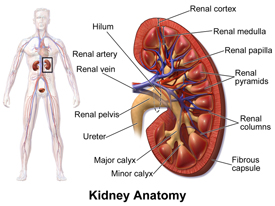 The kidneys are a pair of identical organs located inside the body near the middle of the back. In adults, each kidney is about the size of a fist. Shaped like the beans that carry their name, the kidneys filter waste out of the bloodstream, creating urine which passes into the bladder.
The kidneys are a pair of identical organs located inside the body near the middle of the back. In adults, each kidney is about the size of a fist. Shaped like the beans that carry their name, the kidneys filter waste out of the bloodstream, creating urine which passes into the bladder.
Kidney tests measure how well the kidneys are working, particularly what types of substances are being released into the urine, at what levels and how quickly. Different tests measure different functions of the kidneys. You should talk with the healthcare team about what tests are being done and for what reasons.
Kidney tests can be performed using blood or urine samples and do not hurt or have any side effect.
Types of Kidney Tests
Creatinine Clearance
A creatinine clearance test measures how well the kidneys are working. Creatinine is a protein that is removed from the blood by the kidneys. Measuring the amounts of creatinine in the urine and in the blood allows doctors to measure kidney function.
To conduct the test, urine is collected in a container for 12 to 24 hours. The urine is collected every time your child goes to the bathroom. If you are collecting urine at home for a creatinine clearance it is important to:
- Collect ALL of the urine for 24 hours
- Store the urine in a dark bottle or covered with a dark cloth
- Store the urine container in the refrigerator or on ice until you return to the hospital
Glomerular Filtration Rate (GFR)
The glomerular filtration rate test looks at how well the kidneys are working. A special substance, known as a “tracer” is given in a vein. After the tracer is given, follow-up tests (blood samples and/or imaging) are done to determine how quickly the tracer passes through the kidneys and is removed from the body.
Renal Function Test
Renal function tests measure the amounts of certain substances released into the blood or urine by the kidneys. A higher or lower than normal amount of a substance can be a sign that the kidneys are not working as they should.
These tests are performed on blood or urine samples and do not have any side effects.
Urinalysis
A urinalysis counts the number of white blood cells and red blood cells in the urine. It also tests for protein, bacteria and sugar in the urine. A small amount of urine is collected in a cup and sent to the laboratory to be tested. This is a painless test and does not have any side effects.
